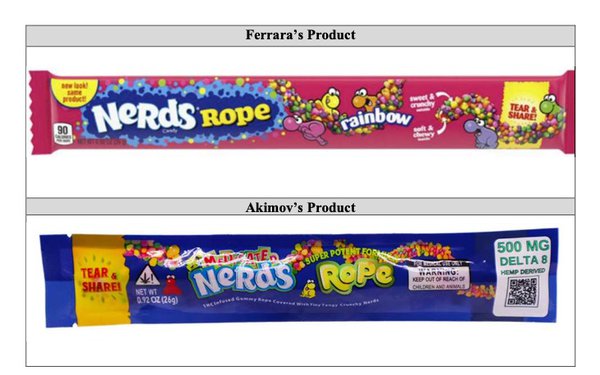
Image above illustrates Ferrara Candy Co's legal filing against
Akimov LLC for alleged poached-trademark branding.
If you want to market hemp, marijuana or their myriad derivatives, consider getting a law degree.
That’s the
prima facie evidence from two lawsuits involving Delta-8 THC and Nerds candy -- and a potential third case in which multistate marijuana operators are teaming up to sue the federal
government.
As reported last year, in 2018 Congress passed the
Agricultural Improvement Act, legalizing the growing and distribution of hemp in most states. But to be federally legal, hemp cannot contain more than 0.3% of Delta-9 THC.
What slipped under
the Congressional radar was Delta-8 THC, which can be synthesized from hemp-derived CBD while providing a much stronger mental and physical effect than CBD.
advertisement
advertisement
Research provider Brightfield Group
dubbed Delta-8 THC “the hottest new cannabinoid of 2021.”
While individual states are scrambling to declare whether Delta-8 THC is legal within their borders, the federal court
system has just weighed in on the subject.
It came in a ruling by the U.S. Court of Appeals for the Ninth Circuit in a copyright and trademark-infringement case brought by e-cigarette and
vaping products manufacturer AK Futures LLC against Boyd Street Distro LLC.
AK Futures alleged that Boyd Street, which distributes tobacco products, sold counterfeit, Delta-8 THC-infused
versions of AK Futures’ Cake-branded products—a claim Boyd Street did not contest.
Boyd Street’s defense was that AK Futures could not own a valid trademark for Cake products
because Boyd Street contended that the federal government considers Delta-8 THC to be illegal.
In upholding a lower court’s finding in favor of AK Futures, the appeals court said the
“plain and unambiguous text” of the Farm Act legislation “compels the conclusion that the Delta-8 THC products before us are lawful.”
In a second Delta-8 lawsuit, last
month Ferrara Candy Co. sued Florida-based Akimov LLC, which does business as Top Five Wholesale, for allegedly selling edibles called Nerd Ropes containing Delta-8 THC on its website.
It was
the latest legal skirmish between Ferrara—which markets Nerd Ropes—and other CPG marketers and companies selling THC-infused edibles with alleged poached-trademark branding.
Ferrara’s legal filing shows images of its Nerds Rope packages and Top Five’s “medicated” and “super potent formula” Nerd Ropes containing 500 mg of Delta-8.
As of today, Nerds Ropes were listed on the Top Five website along with the notation “No products were found
matching your selection.”
A listing titled Rice Crispy Treats also was accompanied by the notation “No products were found matching your selection.”
CPG FYI
reached out to Top Five for comment but had not heard back by deadline.
Meanwhile, Ascend Wellness Holdings and several other multistate marijuana operators are banding together to sue the
federal government over a variety of issues—foremost among them a challenge to the U.S. Controlled Substances Act.
As reported by Marijuana Moment, New York-based Ascend Wellness
has hired the prominent law firm Boies Schiller Flexner LLP.
Among other clients, Boies Schiller chairman David Boies has represented the U.S. Department of Justice and former Vice President
Al Gore.
One example of an area where more clarity is needed is drug paraphernalia enforcement in the wake of the 2018 Farm Act, according to Fred Rocafort, an attorney with the Harris Bricken
law firm.
“It does not make any sense to criminalize implements that can be used to carry or smoke marijuana, as the same implements can be used to carry or smoke hemp,” Rocafort
tells CPG FYI.
“As currently drafted, the drug paraphernalia statute gives far too much discretion to law enforcement when it comes to labeling products as drug
paraphernalia.”